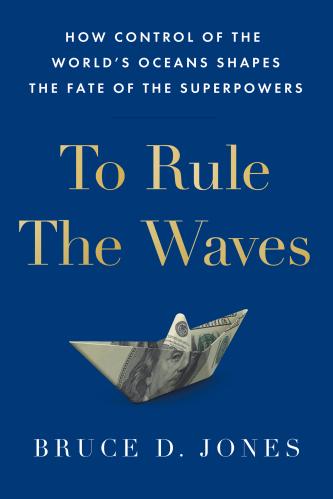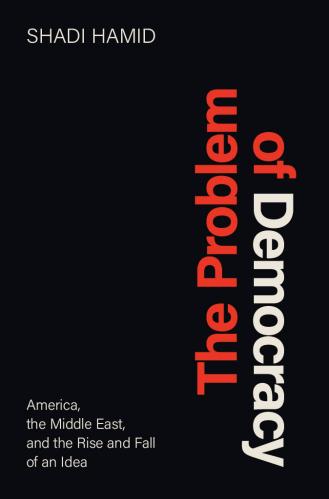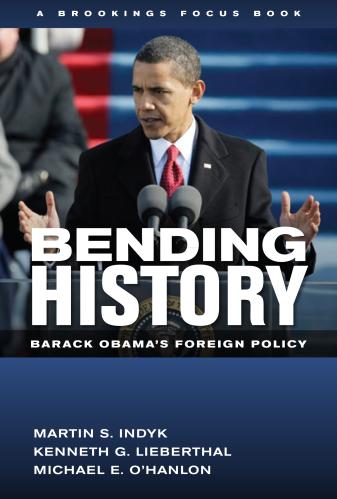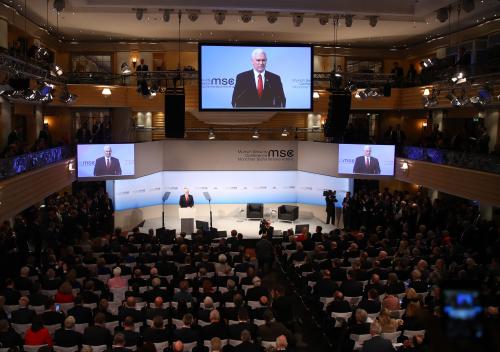Vice President and Director of Foreign Policy Bruce Jones reports from the ground at the Munich Security Conference, which was held February 17 to 19. Read his first dispatch from the conference here.
It’s in the nature of American power that no matter whether the president is present in a gathering, his thinking and his policy statements dominate the global discourse. Nowhere was this more evident than at the Munich Security Conference, where Team Trump had its first encounter with official Europe and where Vice President Mike Pence gave the first major foreign policy speech of this administration.
The day before the start of the Munich meeting, Trump had made an important—if impromptu—statement on foreign policy during his press conference with Israeli Prime Minister Benjamin Netanyahu. He pushed Netanyahu a little bit, noting that he would have to compromise and “hold back a bit” on settlements, if a peace agreement with the Palestinians were to be possible. But he also said that from his perspective he was open to a two-state solution, or a one-state solution, or whatever the parties wanted.
Liberman was crystal clear: For Israel’s security and to preserve Israel’s character as a Jewish state, a two-state solution is the only answer.
In Munich, at least one representative of one of the parties gave him an answer. Israeli Defense Minister Avigdor Liberman, hardly known as a dove, was asked by BBC correspondent Lyse Doucet how he might answer Trump. He waxed historical for a bit about the failure of past efforts, the paucity of (actually) dove-ish governments in Israel, and Palestinian rejection of past offers. But ultimately, Liberman was crystal clear: For Israel’s security and to preserve Israel’s character as a Jewish state, a two-state solution is the only answer. Lieberman’s twist is that he wants to accompany a two-state solution with land and population transfers, so that Israel doesn’t retain a size-able Palestinian minority within its post-peace agreement boundaries—an idea the Palestinians and many on the Israeli left have so far rejected.
Trump didn’t ask, but he also got an answer on another agreement—the Joint Comprehensive Plan of Action (JCPOA), the formal name for the deal between the P5+1 and Iran on the Iranian nuclear file. During the campaign, candidate Trump denounced the JCPOA as “the worst deal ever” and promised to renegotiate it. So far, President Trump has let his foreign policy surrogates signal a different approach, one of retaining the agreement but bolstering pressure on Iran for implementation and upping the ante in terms of curbing Tehran’s regional misbehaviors.
I had a chance to pose the question to former Saudi intelligence chief Prince Turki Al Faisal and Qatar’s former prime minister, Sheikh Hamad bin Jasim Al Thani: Is it better to keep the deal, and work hard on implementation, or tear it up? Both were unequivocal in their answer: The Gulf is better off with the deal than without it. Both saw a need for continued pressure on Iran to implement the deal, and both believed that countering Iranian penetration and manipulation of the region’s conflicts and failed states was a top priority. But faced with a basic question of whether security in the region had been advanced by the deal or not, their answer was a clear yes.
Let’s see if Team Trump was listening.







Commentary
A call for continuity from America’s Middle East allies
A dispatch from the Munich Security Conference
February 20, 2017